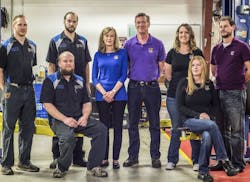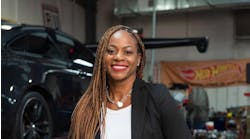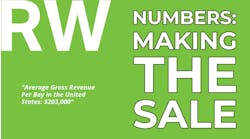At almost any point during the 2016 WORLDPAC Supplier & Training EXPO, you could have found Sam and Tammy Russ on the expo floor, networking between classes, or eating lunch with the same five people. The two owners and their staff of five (now six) were all practically joined at the hip, always joking, laughing and, perhaps most importantly, discussing how valuable the classes were to the future of Import Motor Werks.
“We just see so much value in making it a team event. It helps us to bond in a special way outside the shop,” Tammy says. “We’re like family at this point.”
It says a lot about the husband-and-wife team that between April 21 and 24—which includes two business days—their two service advisors and three technicians weren’t at their Cary, N.C., shop. They were in Dallas for four days of training and bonding. It’s indicative of a culture the two owners built over four years of transitioning leadership after taking over for their son.
For the Russes, achieving that inclusivity was essential, and the results are finally showing: After initially experiencing a decline in sales (they were new to the industry) during the first two years, annual revenue rose from around $900,000 to $1.5 million by 2015.
But getting to this point required a lot of culture and managerial changes Sam and Tammy have slowly integrated into the shop over time, all with the goal of creating a team-oriented environment that focused on being inclusive, offering a clear career path, and moving the business forward as a team.
Import Motor Werks
—Location: Cary, N.C.
Size: 10,000 square feet
Staff: 8 (3 technicians, 2 service advisors, 2 owners, 1 CSR)
Number of Lifts: 9
Average Monthly Car Count: 180
Annual Revenue: $1.5 million
The Backstory
The Russes’ son, an ambitious entrepreneur, opened Import Motor Werks in 2007 with the aim of providing expert knowledge for luxury, European vehicles.
Sam and Tammy, however, couldn’t come from more different backgrounds. With years of experience as a military officer, Sam eventually became an airline pilot, with hopes of one day opening his own business after retiring. With similar dreams, Tammy spent most of her career in information technology.
During their off-hours, Sam and Tammy spent many hours in the shop with their son, getting to know the staff and operations. So when their son believed it was time to move on to a new project, the couple believed Import Motor Werks could be the next natural step for their careers.
The Problem
Their son—who ran the business with vigor and passion for five years, bringing sales to $1.2 million by 2012, and had outfitted the shop with the latest tools and equipment—had ambitions of turning his shop into a technological force filled with the area’s best and brightest technicians.
But when it came down to it, Sam and Tammy say they just had different management styles. And being new to the industry, they believed working with employees was crucial for business growth.
A few common shop practices the two new owners planned to change:
- New lifts and diagnostic tools were often purchased without input from staff or considering a long-term plan for return on investment.
- The shop offered competitive hourly wages that had attracted two dynamite technicians who specialized in European models, but failed to include any perks or bonuses for achieving any sort of benchmarks.
- The training schedule was also sporadic, with the shop often playing catch-up with its high workload and small amount of space (the original building was half the size).
While none of these reasons were crippling to the shop, Sam and Tammy couldn’t lead the way they envisioned without making some changes.
The Solution
With very little automotive knowledge themselves, Sam and Tammy looked to their team for guidance. They hired a consultant, focused on budgeting and KPIs, and implemented several methods of including staff members in business decisions, creating a more comfortable working environment, getting everyone invested in the future of the shop and improving their personal numbers.
Instituting weekly meetings. First and foremost, Sam and Tammy established weekly meetings to cover any decisions related to training, hiring, and tools and equipment. They write down any ideas or input from employees on a board and follow up on them each week.
“They’re more knowledgeable than we are,” Sam says. “We ask our staff for all kinds of information because we quite frankly don’t have that kind of technical mindset. We want them to feel we value their input.”
Consulting employees on equipment purchases. At the beginning of each year, the Russes ask for each employee’s “wish list,” which consists of tools and equipment the techs and service writers believe would be beneficial to the shop.
“We’ll discuss a five-year plan for making the purchase worth it and if we can afford to do it, we’ll end up buying it,” Tammy says.
Finding a better work environment. The 3,000 square feet of shop floor space in the former Import Motor Werks often created clutter and made it difficult for the three technicians to divide up four bays for work and was killing their efficiency. In addition, the shop floor didn’t have any air conditioning.
“With the heat in the summer here, it felt like it was 100 degrees back there,” Sams says.
Sam and Tammy moved into a 10,000-square-foot building equipped with nine bays, designated shelving for tools and parts, and more walking space around vehicles.
“These all sound like small things, but it’s actually huge,” Tammy says. “Moving to this space, they have five air conditioning units. It’s lovely back there.”
Building better pay plans. The two owners crafted individualized, salary-based pay plans for each employee, with a focus on bonuses for achieving certain benchmarks for productivity, efficiency and sales. They sat down with each department individually to create a plan that worked for everyone.
“It gets them more invested in their success, and in our overall success as a team,” Tammy says.
Creating a learning culture. There is now a huge focus on continuing education. Sam and Tammy outlined a yearly training schedule. They decided as a group which training would be most beneficial in addition to ASE training, which in 2016 focused on hybrid technology. Throughout the year, training includes both sending employees to training individually and attending training together as a group, as they did with WORLDPAC.
The Aftermath
As mentioned before, revenue has risen over four years to $1.5 million. Better working conditions and a focus on efficiency in pay plans has greatly improved efficiency and productivity to 120 and 100 percent, respectively, with the three technicians receiving two to three bays at a time. The Russes will be hiring another technician soon.
While hiring a consultant and focusing on processes and profit margins contributed greatly to the shop’s growth, Sam and Tammy credit a great deal to a change in shop culture and a focus on teamwork.
“We don’t look at it as ‘owners and employees.’ We look at it more as a family, a team,” Sam says. “And when you have that environment, you don’t have to sit there with a whip and a chain. Everyone knows what to do.”
The Takeaway
Sam and Tammy now place a great deal of importance on involving their team in business decisions, and really taking the time to consider how it will affect everyone. “They know we care about them and they know we will stick up for them—and they’ll do the same for us,” Tammy says.



